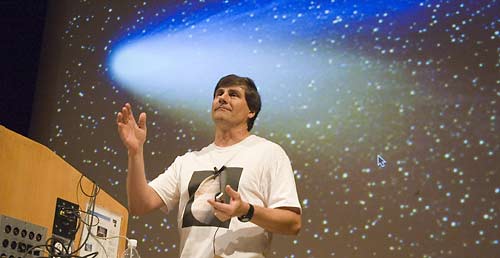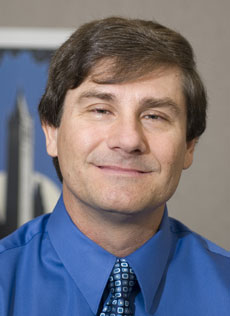UC Berkeley Press Release
 Alex Filippenko brings cosmic photos, music, passion, and a host of T-shirts to his popular Introduction to General Astronomy class. (Photos by Steve McConnell / UC Berkeley) |
Astronomer Alex Filippenko named national Professor of the Year
BERKELEY – What makes an outstanding professor? Try theme songs for every class, 40 different T-shirts to introduce each day's lecture topic, flying doughnut demonstrations and, last but not least, what one student called "the ability to light the astral fire in undergraduates."
These are just a few of the bonuses that University of California, Berkeley, professor Alex Filippenko sprinkles throughout his introductory astronomy class, which draws between 750 and 800 students per semester and earned him this year's Professor of the Year Award, sponsored by The Carnegie Foundation for the Advancement of Teaching and administered by the Council for Advancement and Support of Education (CASE).
 Alex Filippenko, CASE Professor of the Year |
Announced today (Thursday, Nov. 16) at a luncheon in Washington, D.C., the award acknowledges "outstanding professors for their dedication to teaching, commitment to students and innovative instructional methods." Four national winners are chosen, one each from two-year community colleges, four-year colleges, master's degree-granting institutions, and doctoral and research universities, the category for which Filippenko was chosen.
"Research universities such as UC Berkeley are often criticized for not caring that much about undergraduate teaching," said Filippenko. "Having a national award in the category of doctoral and research universities shows that UC Berkeley, in particular, and research universities, in general, really do value teaching."
A world-renowned expert on exploding stars (supernovae), black holes, galaxies, and cosmology, Filippenko has passionately taught "Introduction to General Astronomy" once a year since he joined the Department of Astronomy faculty 20 years ago and estimates that one-sixth of all undergraduates take it. For four of the past six years, he has been voted "Best Professor" on campus in informal student polls, and his course is one of the most popular, often winning the polls' "Best Course" category. At RateMyProfessors.com, Filippenko has the most reviews of any UC Berkeley professor. One online reviewer wrote: "His class is a must for any Cal student. You learn so much and don't even realize it, he's so entertaining." A campus fraternity review flatly stated "Filippenko is the greatest professor you'll meet ... TAKE THIS CLASS!!!!!"
Another anonymous reviewer urged students not to miss his Halloween lecture, in which he dresses up as a black hole and throws out astronomy-themed candy - Starburst, Milky Way, Mars, Eclipse - to demonstrate the quantum-mechanical evaporation of black holes postulated by Stephen Hawking.
The enthusiasm he brings to the esoteric topics of astronomy draws as much as one-fifth of the class to additional three-hour bull sessions on astronomy topics not covered in the class and not on the exam.
"Students ... sit on the edges of their seats for three hours that fly by as Alex works his magic, explaining extremely complicated topics of theoretical physics in clear and simple terms to a room of mostly first- and second-year non-science majors," wrote former UC Berkeley student and biophysics major Heather Newman in a nomination letter. "This in itself should be a testament to Alex's prowess as a professor: He inspires students to sit through an extra nine hours of lecture solely for the sake of learning more!"
Filippenko said he has a simple philosophy: "to bring the magnificence of the cosmos to the students and to show them that through careful observations, experiments and interpretations, we humans have the potential to understand how our universe works."
He brings the cosmos to life in classroom demonstrations, which have won him two campus awards for distinguished teaching. For example, he ties a doughnut to a string and twirls it over his head to show how gravity keeps the moon in orbit - until the doughnut breaks and flies off in a straight line into the class, demonstrating Newton's law of inertia.
Filippenko strongly believes that excellence in both research and teaching go hand-in-hand. Each semester, he holds a contest to select a dozen students to accompany him in groups of three while conducting nighttime research at Lick Observatory near San Jose. The competition draws up to 80 entries, ranging from essays and posters to paintings, songs, poems and the occasional batch of cookies (he's not immune to food bribes, he says). The winning students earn the rare privilege of seeing how exploding supernovae are studied with modern instruments and discussing cosmology until dawn.
In the past 20 years, he also has invited over 60 undergraduates to join his research team, and collectively they have discovered with his robotic telescope and received credit for about 600 new supernovae. For these efforts, Filippenko received in 2002 UC Berkeley's Distinguished Research Mentoring of Undergraduates Award. He has also supervised a large number of post-doctoral fellows and graduate students on their way to PhDs.
Besides the observatory visits, he organizes "star parties" to view meteor showers, eclipses and other celestial events, and occasionally drops in at the dorms to have dinner with students.
The proof of teaching is in the students, however, and Filippenko enthralls them.
"I consider it a great achievement that by the end of the semester, a substantial fraction - perhaps a majority of the students - are wishing it would continue for an additional semester," he said, noting that Astronomy C10 is intended for freshmen and sophomores in the humanities, not for science majors. "Many of these are precisely those students who had a negative experience with science in junior high and high school because they weren't taught the right way. They come in very frightened and apprehensive about the course, and they leave having really enjoyed it, finally understanding the value and beauty of science."
Filippenko's research findings are documented in about 500 published papers, and he is one of the world's most highly cited astronomers. He was a Guggenheim Foundation Fellow in 2001 and a Miller Professor in 1996 and 2005. In January, he will receive the Richtmyer Memorial Award of the American Association of Physics Teachers, given each year to an eminent research physicist who is asked to deliver a lecture suited to non-specialists at the association's annual meeting. His topic will be the discovery, to which he made major contributions, that the expansion of the universe is speeding up, or accelerating, with time, driven by a mysterious form of dark energy. This discovery was the top "Science Breakthrough of 1998," according to the editors of Science magazine.
An introductory astronomy textbook, "The Cosmos: Astronomy in the New Millennium" (2001), that he wrote with Jay M. Pasachoff, won the Texty Excellence Award in 2001 for best new textbook in the physical sciences, and is now in its third edition.
Filippenko has racked up more than 400 public lectures in a wide range of venues, has taped two series of astronomy lectures available on video from The Teaching Company, and can be watched free worldwide thanks to Webcasting of Astronomy C10. In 2002, he was a Phi Beta Kappa Visiting Scholar, lecturing at 15 different institutions. He has appeared in many television documentaries, such as "Stephen Hawking's Universe," "Mysteries of Deep Space," "Runaway Universe," and the upcoming two-part series "Exploring Time." He is also the recipient of the 2004 Carl Sagan Prize for Science Popularization from the Trustees of Wonderfest.
During the past decade, he also has been very active in the Astronomical Society of the Pacific as a board member, vice president and president. The society's main goals are to disseminate astronomical results to the general public and to train K-12 science teachers.
Teaching undergraduates, though, is Filippenko's first love.
"Seeing the great thrill and joy students get from interacting with me, learning the wonders of the universe, has been the ultimate reward," he said.
The Professor of the Year award was created in 1981 and is the only national initiative specifically designed to recognize excellence in undergraduate teaching and mentoring. Since its inception, one other UC Berkeley professor, Christina Maslach of psychology, has won the national award (1997), while three other faculty have won the organization's top state teaching awards.
"This year's four national Professors of the Year come from quite distinct academic environments, yet, they all share an abiding commitment to student learning, a profound belief in the transformative power of education, a pedagogical approach designed to stimulate creative and critical thinking, and a passionate devotion to their respective fields of study," said John Lippincott, president of CASE. "They exemplify teaching at its best and, in so doing, remind us of what makes America's colleges and universities truly great."
Additional reading:

